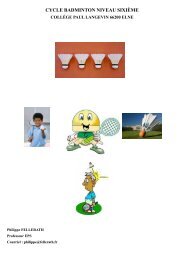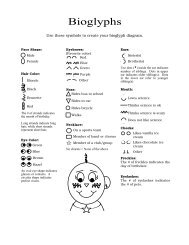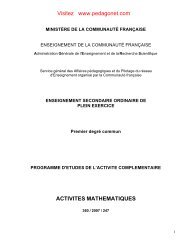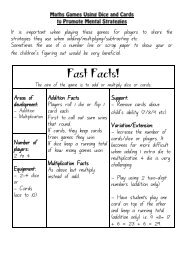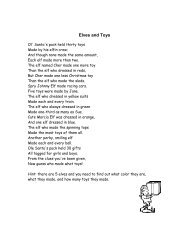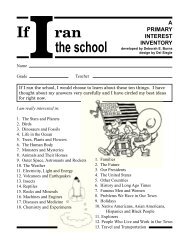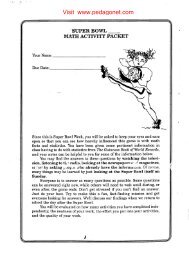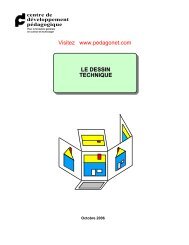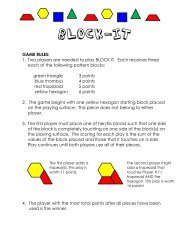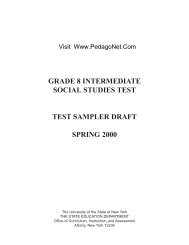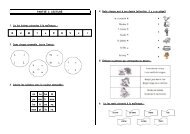- Page 1 and 2: Effective Instruction for Middle Sc
- Page 3 and 4: Effective Instruction for Middle Sc
- Page 5 and 6: Contents Foreword: A Schoolwide App
- Page 7 and 8: Word Learning Sample Lesson: Teachi
- Page 9 and 10: Position-Reason 345 Semantic Featur
- Page 11 and 12: Foreword: A Schoolwide Approach to
- Page 13 and 14: Figure 2. A Schoolwide Reading Inte
- Page 15 and 16: Tier I: Schoolwide Strategies and R
- Page 17 and 18: Elements of Strategic Intervention
- Page 19 and 20: DEVELOP A PLAN FOR COLLECTING, MANA
- Page 21 and 22: Introduction We hope that this guid
- Page 23 and 24: Part 1 Assessing Struggling Readers
- Page 25 and 26: Phonological awareness Progress mon
- Page 27 and 28: Chapter 1 Overview of Assessment at
- Page 29 and 30: In the early elementary grades, scr
- Page 31 and 32: If the student has low fluency, tea
- Page 33 and 34: Chapter 2 Selecting and Administeri
- Page 35 and 36: the number of error words from the
- Page 37 and 38: Assuming that the rate of reading f
- Page 39 and 40: Note that not all difficulties with
- Page 41 and 42: Caveats about oral reading fluency
- Page 43 and 44: Chapter 3 Using Assessment Results
- Page 45 and 46: Figure 11. Results of Miss Lopez’
- Page 47: Figure 12. Miss Lopez’s Groupings
- Page 51 and 52: Monday: On Monday, Miss Lopez will
- Page 53 and 54: Sample Weekly Schedule for Remainde
- Page 55 and 56: Part 2 Effective Instruction for St
- Page 57 and 58: Statement of objective or purpose T
- Page 59 and 60: This phase in the lesson is an exce
- Page 61 and 62: Monitor Student Learning Monitoring
- Page 63 and 64: Chapter 5 Delivering Effective Inst
- Page 65 and 66: Teacher: That’s right, said. Poin
- Page 67 and 68: Quick Pacing of Lessons Quick pacin
- Page 69 and 70: student might be quiet, but will pr
- Page 71 and 72: Part 3 Research-supported Instructi
- Page 73 and 74: Sample Lessons in this Book In the
- Page 75 and 76: Chapter 6 Comprehension Most strugg
- Page 77 and 78: efore- and during-reading COMPREHEN
- Page 79 and 80: Step #4: Students Asking and Answer
- Page 81 and 82: Student: Find the vowels in the wor
- Page 83 and 84: • Have students record the import
- Page 85 and 86: Figure 20. Previewing Planning Shee
- Page 87 and 88: Preparation 1. Read through the pas
- Page 89 and 90: 1. Introduce the Level 1, “right
- Page 91 and 92: Figure 22. Level 1 “Right There
- Page 93 and 94: Preparation Read the passage and id
- Page 95 and 96: Guided Practice Grouping: Whole cla
- Page 97 and 98: Figure 24. Level 2 “Putting It To
- Page 99 and 100:
Preparation Read the passage and id
- Page 101 and 102:
Note: The goal for Level 3 question
- Page 103 and 104:
Figure 26. Level 3 “Making Connec
- Page 105 and 106:
minds called mental images. Forming
- Page 107 and 108:
Variation Grouping: Whole class 1.
- Page 109 and 110:
Figure 27. Mental Imagery Log. MENT
- Page 111 and 112:
Materials • Copies of a short pas
- Page 113 and 114:
Teacher: What is the most important
- Page 115 and 116:
Student: We could use the strategy
- Page 117 and 118:
Figure 29. Main Idea Form. MAIN IDE
- Page 119 and 120:
Figure 30. Elements of Narrative Te
- Page 121 and 122:
Figure 32. Signal Words. Cause-Effe
- Page 123 and 124:
Figure 33. Identifying Text Structu
- Page 125 and 126:
How to use a graphic organizer Befo
- Page 127 and 128:
Know and Learn Charts The Know and
- Page 129 and 130:
Figure 40. Cause-Effect Semantic Ma
- Page 131 and 132:
Figure 46. Description Graphic Orga
- Page 133 and 134:
after-reading sample lesson Summari
- Page 135 and 136:
Figure 51. How to Write a Summary.
- Page 137 and 138:
Independent Practice Grouping: Part
- Page 139 and 140:
Figure 52. Example of Choosing a Su
- Page 141 and 142:
State Objective/Purpose Teacher: To
- Page 143 and 144:
c. Allow small groups 4-5 minutes t
- Page 145 and 146:
Figure 53. Main Idea Log. MAIN IDEA
- Page 147 and 148:
Chapter 7 Vocabulary terms to know
- Page 149 and 150:
Figure 54. Which Words Do I Teach?
- Page 151 and 152:
Here is a helpful checklist for pla
- Page 153 and 154:
• Have students keep a journal of
- Page 155 and 156:
Preparation Preview the text, looki
- Page 157 and 158:
4. If students have difficulty gene
- Page 159 and 160:
AFTER READING Grouping: Partners 1.
- Page 161 and 162:
Independent Practice 1. Before read
- Page 163 and 164:
Figure 62. Sample Criteria Chart fo
- Page 165 and 166:
word knowledge sample lesson Semant
- Page 167 and 168:
STATE OBJECTIVE/PURPOSE Teacher: To
- Page 169 and 170:
Teacher: Now across the top, we are
- Page 171 and 172:
A finished chart may look like the
- Page 173 and 174:
Allow students to look at their cha
- Page 175 and 176:
Figure 71. Sample Vocabulary Writin
- Page 177 and 178:
Figure 73. Semantic Feature Analysi
- Page 179 and 180:
Objective Students will develop a d
- Page 181 and 182:
4. Model completing the Frayer Mode
- Page 183 and 184:
Student: If we don’t really under
- Page 185 and 186:
word consciousness sample lesson Pr
- Page 187 and 188:
2. Ask students to make (with partn
- Page 189 and 190:
Monitor Student Learning During the
- Page 191 and 192:
Objective The students will use pri
- Page 193 and 194:
For example, I might think, “I se
- Page 195 and 196:
Generalization Teacher: Did thinkin
- Page 197 and 198:
Your completed chart might look lik
- Page 199 and 200:
• Decode words quickly and accura
- Page 201 and 202:
Objective Students will recognize t
- Page 203 and 204:
Write the meaning “to carry” un
- Page 205 and 206:
Independent Practice Grouping: Part
- Page 207 and 208:
Figure 82. Sample Word Part Clue Ev
- Page 209 and 210:
Figure 84. Common Suffixes. SUFFIX
- Page 211 and 212:
word learning sample lesson Using C
- Page 213 and 214:
Materials • Types of Context Clue
- Page 215 and 216:
may consider developing sample sent
- Page 217 and 218:
Figure 91. Context Clue Strategy. 1
- Page 219 and 220:
Figure 94. Sample Context Clues Cha
- Page 221 and 222:
word learning sample lesson The Voc
- Page 223 and 224:
Model and Teach Grouping: Whole cla
- Page 225 and 226:
Accept responses. raise your hand i
- Page 227 and 228:
Teacher: Today I am going to show y
- Page 229 and 230:
4. Guide students through Step 3 of
- Page 231 and 232:
Chapter 8 Fluency terms to know Aut
- Page 233 and 234:
Figure 98. Accuracy Guidelines. Ind
- Page 235 and 236:
Partner Reading Acknowledgments Bas
- Page 237 and 238:
Partner Reading Routine 1. Partner
- Page 239 and 240:
Practice, Practice, Practice Allow
- Page 241 and 242:
Progress Monitoring The most effici
- Page 243 and 244:
Chapter 9 Word Recognition Acknowle
- Page 245 and 246:
What do students need to know about
- Page 247 and 248:
3. Read each word part. Remember th
- Page 249 and 250:
A sample sequence for teaching the
- Page 251 and 252:
It is expected that a comprehensive
- Page 253 and 254:
Word Analysis (WA) Instruction/Word
- Page 255 and 256:
. Vocabulary Instruction Characteri
- Page 257 and 258:
Listening Comprehension Characteris
- Page 259 and 260:
Students Who Do Not Respond Adequat
- Page 261 and 262:
come to a word that you don’t kno
- Page 263 and 264:
word because it is made from the wo
- Page 265 and 266:
The next word is piano. Remember th
- Page 267 and 268:
word Recognition sample lesson The
- Page 269 and 270:
at the end of the word. Let’s rea
- Page 271 and 272:
Teacher: I’m going to show you ho
- Page 273 and 274:
Point to “press”. Read the part
- Page 275 and 276:
Generalization Teacher: How might y
- Page 277 and 278:
Part 4 Appendix Appendix Contents P
- Page 279 and 280:
Context Clue Strategy 361 Types of
- Page 281 and 282:
Planning Checklist for Implementing
- Page 283 and 284:
DEVELOP A SCHOOLWIDE PLAN FOR IMPLE
- Page 285 and 286:
Characteristics of Effective Reader
- Page 287 and 288:
Accuracy Guidelines # of words read
- Page 289 and 290:
Sample Instructional Sequence for R
- Page 291 and 292:
Guide to Adapting Instruction Adapt
- Page 293 and 294:
Previewing Planning Sheet PLANNING
- Page 295 and 296:
Level 1 “Right There” Questions
- Page 297 and 298:
Level 2 “Putting It Together” Q
- Page 299 and 300:
Level 3 “Making Connections” Qu
- Page 301 and 302:
Previewing and Questioning Learning
- Page 303 and 304:
Question Cards: Red (Front) Level 1
- Page 305 and 306:
Question Cards: Red (Back) Level 1
- Page 307 and 308:
Question Cards: White (Front) Level
- Page 309 and 310:
Question Cards: White (Back) Level
- Page 311 and 312:
Question Cards: Blue (Front) Level
- Page 313 and 314:
Question Cards: Blue (Back) Level 3
- Page 315 and 316:
MENTAL IMAGERY LOG Title: Paragraph
- Page 317 and 318:
MAIN IDEA FORM Name(s) ____________
- Page 319 and 320:
MAIN IDEA LOG Title of passage: ___
- Page 321 and 322:
Signal Words Cause-Effect How or wh
- Page 323 and 324:
Identifying Text Structure If the a
- Page 325 and 326:
Elements of Narrative Text Examples
- Page 327 and 328:
Elements of Expository Text Example
- Page 329 and 330:
Story Map Exposition: Conflict: Ris
- Page 331 and 332:
Main Idea Web Main Idea The Reading
- Page 333 and 334:
K-L Chart Know What do I already kn
- Page 335 and 336:
Cause-Effect Chart (Herringbone) Ca
- Page 337 and 338:
Cause-Effect Chart (Semantic Map) C
- Page 339 and 340:
Cause-Effect Chart (Basic) The Read
- Page 341 and 342:
Chronological Ordering/Sequencing T
- Page 343 and 344:
Temporal Sequencing The Reading Tea
- Page 345 and 346:
Compare/Contrast The Reading Teache
- Page 347 and 348:
Description (Web) word or idea The
- Page 349 and 350:
Description (Chart) The Reading Tea
- Page 351 and 352:
Problem-Solution Solution Problem S
- Page 353 and 354:
Problem-Solution-Result Problem Sol
- Page 355 and 356:
Position-Reason Position Reason 1 R
- Page 357 and 358:
Semantic Feature Analysis Grid Conc
- Page 359 and 360:
Frayer Model Non Adapted with permi
- Page 361 and 362:
The Origins of English If this is t
- Page 363 and 364:
Word Part Clue Evaluation Chart WOR
- Page 365 and 366:
Common Prefixes PREFIX % of All Pre
- Page 367 and 368:
Common Suffixes SUFFIX % OF ALL SUF
- Page 369 and 370:
Common Greek and Latin Roots ROOT O
- Page 371 and 372:
Context Clue Strategy 1. Reread the
- Page 373 and 374:
Types of Context Clues Type of Cont
- Page 375 and 376:
Guide for Context Clues Practice Un
- Page 377 and 378:
If you read a word that you do not
- Page 379 and 380:
Word _________________________ Voca
- Page 381 and 382:
Fluency Chart Name: 150 140 130 120
- Page 383 and 384:
Syllable Type Syllable Types Exampl
- Page 385 and 386:
Multisyllable Word Reading Strategy
- Page 387 and 388:
Guidelines for Reviewing a Reading
- Page 389 and 390:
Word Analysis (WA) Instruction/Word
- Page 391 and 392:
. Vocabulary Instruction Characteri
- Page 393 and 394:
Comprehension Instruction Character
- Page 395 and 396:
References Anders, P. L. & Bos, C.
- Page 397 and 398:
Diamond, L., & Gutlohn, L. (2006).
- Page 399 and 400:
Kame’enui, E. J., & Carnine, D. W
- Page 401 and 402:
Rumelhart, D. E. (1980). Schemata:
- Page 403 and 404:
Vaughn Gross Center for Reading and
- Page 405 and 406:
Resources for the Reading Teacher N
- Page 407 and 408:
Burns, P. C., & Roe, B. D. (2002).
- Page 409 and 410:
Moats, L. C. (2000). Speech to prin




